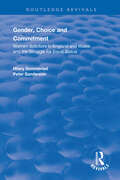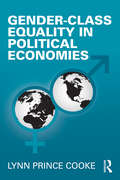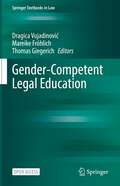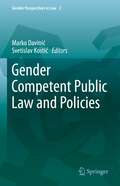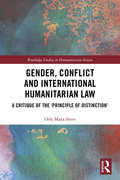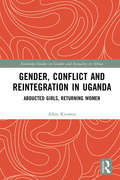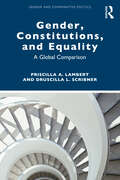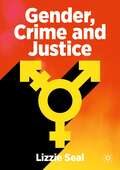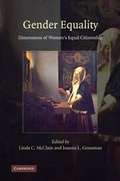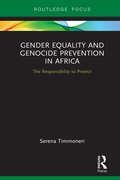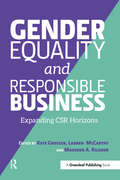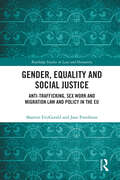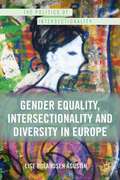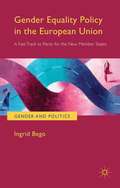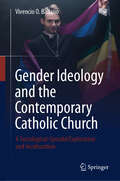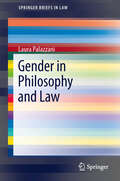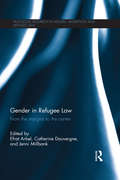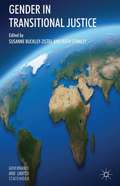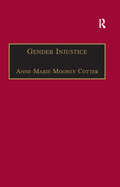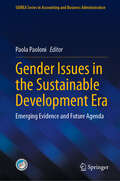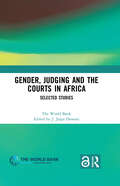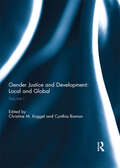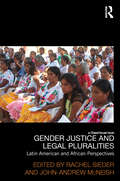- Table View
- List View
Gender, Choice and Commitment: Women Solicitors in England and Wales and the Struggle for Equal Status (Routledge Revivals)
by Hilary Sommerlad Peter SandersonFirst published in 1998, this volume is the first full-length discussion of women’s experiences in the solicitors’ profession in the UK. It provides an account which is grounded in historical research and a contemporary research study. The authors explore this material to analyze both women’s own experiences and the mainstream culture and structure of the profession. Following a treatment of the struggle against the formal exclusionary barriers to women’s entry to the profession, this book then seeks to identify the informal obstacles which were subsequently erected to women’s participation and career progression, and examine their persistence, in a modified form, into the contemporary era. The analysis draws on perspectives from feminist jurisprudence to the sociology of the professions to shed light on the processes which support women’s continued subordination in employment as lawyers.
Gender, Choice and Commitment: Women Solicitors in England and Wales and the Struggle for Equal Status (Routledge Revivals)
by Hilary Sommerlad Peter SandersonFirst published in 1998, reissued here with a new preface, this volume is the first full-length discussion of women’s experiences in the solicitors’ profession in the UK. It provides an account which is grounded in historical research and a contemporary research study. The authors explore this material to analyze both women’s own experiences and the mainstream culture and structure of the profession. Following a treatment of the struggle against the formal exclusionary barriers to women’s entry to the profession, this book then seeks to identify the informal obstacles which were subsequently erected to women’s participation and career progression, and examine their persistence, in a modified form, into the contemporary era. The analysis draws on perspectives from feminist jurisprudence to the sociology of the professions to shed light on the processes which support women’s continued subordination in employment as lawyers.
Gender-Class Equality in Political Economies (Perspectives on Gender)
by Lynn Prince CookeGender-Class Equality in Political Economies offers an in-depth analysis of gender-class equality across six countries to reveal why gender-class equality in paid and unpaid work remains elusive, and what more policy might do to achieve better social and economic outcomes. This book is the first to meld cross-time with cross-country comparisons, link macro structures to micro behavior, and connect class with gender dynamics to yield fresh insights into where we are on the road to gender equality, why it varies across industrialized countries, and the barriers to further progress.
Gender-Competent Legal Education (Springer Textbooks in Law)
by Dragica Vujadinović Mareike Fröhlich Thomas GiegerichMale-dominated law and legal knowledge essentially characterized the whole of pre-modern history in that the patriarchy represented the axis of social relations in both the private and public spheres. Indeed, modern and even contemporary law still have embedded elements of patriarchal heritage, even in the secular modern legal systems of Western developed countries, either within the content of legislation or in terms of its implementation and interpretation. This is true to a greater or lesser extent across legal systems, although the secular modern legal systems of the Western developed countries have made great advances in terms of gender equality. The traditional understanding of law has always been self-evidently dominated by men, but modern law and its understanding have also been more or less “malestreamed.” Therefore, it has become necessary to overcome the given “maskulinity” of legal thought. In contemporary legal and political orders, gender mainstreaming of law has been of the utmost importance for overcoming deeply and persistently embedded power relations and gender-based, unequal social relations. At the same time and equally importantly, the gender mainstreaming of legal education – to which this book aims to contribute – can help to gradually eliminate this male dominance and accompanying power relations from legal education and higher education as a whole. This open access textbook provides an overview of gender issues in all areas of law, including sociological, historical and methodological issues. Written for students and teachers around the globe, it is intended to provide both a general overview and in-depth knowledge in the individual areas of law. Relevant court decisions and case studies are supplied throughout the book.
Gender Competent Public Law and Policies (Gender Perspectives in Law #2)
by Marko Davinić Svetislav KostićThis book offers a new perspective on public law and public policies. The collection of papers gathered here begins with an in-depth discussion on gender perspectives in constitutional law, which can support gender justice, but also perpetuate patriarchal norms. The book then analyzes the role of the European Ombudsman in the area of gender discrimination. Despite its limited jurisdiction, this institution has become a significant complementary tool in the protection of gender equality and the elimination of gender discrimination at the EU level. Particular attention is paid to the importance of mainstreaming gender into public policies. Thus, the legal and institutional frameworks of Spain and Serbia are presented, which can serve as an inspiration to other countries. Another important aspect covered in the book is an analysis of systemic differences between the average wages of women and men in the six countries of the Western Balkans. In turn, the book presents a discussion on female genital mutilation as a highly gendered crime based on extreme versions of rigid, patriarchal ethnic and religious norms and customs. It is analyzed through the lenses of the Istanbul Convention, as a tool for combating violence against women. Particular attention is paid to femicide, its definitions, forms, and phenomenological characteristics. Having been only recently acknowledged, femicide is still characterized by an inadequate judicial response in many countries. In this regard, a special focus is on German and Serbian experiences in acknowledging femicide and combating it through various measures. Finally, the importance of stalking laws is discussed, as stalking is a highly gendered crime that many states fail to combat adequately. The collection of essays offered in this book will be of interest to all those working in the field of public law, to policymakers, and to students and academics looking to broaden and deepen their research on various issues in public law and policies from gender perspectives.
Gender, Conflict and International Humanitarian Law: A critique of the 'principle of distinction' (Routledge Studies in Humanitarian Action)
by Orly Maya SternThis book conducts a gendered critique of the ‘principle of distinction’ in international humanitarian law (IHL), with a focus on recent conflicts in Africa. The ‘principle of distinction’ is core to IHL, and regulates who can and cannot be targeted in armed conflict. It states that civilians may not be targeted in attack, while combatants and those civilians directly participating in hostilities can be. The law defines what it means to be a combatant and a civilian, and sets out what behaviour constitutes direct participation. Close examination of the origins of the principle reveals that IHL was based on a gendered view of conflict, which envisages men as fighters and women as victims of war. Problematically, this view often does not accord with the reality in ‘new wars’ today in which women are playing increasingly active roles, often forming the backbone of fighting groups, and performing functions on which armed groups are highly reliant. Using women’s participation in ‘new wars’ in Africa as a study, this volume critically examines the principle through a gendered lens, questioning the extent to which the principle serves to protect women in modern conflicts and how it fails them. By doing so, it questions whether the principle of distinction is suitable to effectively regulate the conduct of hostilities in new wars. This book will be of much interest to students of international law, gender studies, African politics, war and conflict studies, and international relations.
Gender, Conflict and Reintegration in Uganda: Abducted Girls, Returning Women (Routledge Studies on Gender and Sexuality in Africa)
by Allen KiconcoThis book explores what happened when the tens of thousands of girls (now women) abducted by Lord’s Resistance Army and inducted into their campaign of violence against the Ugandan government, returned home. Drawing on extensive original research, the author considers the challenges which the formerly abducted women have encountered upon their return, the strategies which have been used to aid their reintegration, and the enduring stigma of abduction which they continue to suffer from. The author demonstrates that ‘home’, a place of hope and comfort, can also be a hostile environment which leaves formerly abducted women in precarious and vulnerable situations. The many shortcomings in the reintegration process have serious implications for the prospects of post-conflict reconstruction. Analysing reintegration as a long-term and dynamic process which involves complex negotiations and exchanges between hosting communities and formerly abducted women, this book will be of interest to scholars, policymakers and practitioners working in the fields of post-conflict reconstruction, African politics and gender and conflict.
Gender, Constitutions, and Equality: A Global Comparison (Gender and Comparative Politics)
by Priscilla A. Lambert Druscilla L. ScribnerThis book addresses whether the "gendering" of constitutions promotes women’s equality. The authors use a mixed-methods approach to explore how constitutional gender rights affect political processes and strategies, legislative and judicial outcomes, and ultimately women’s equality. They employ a cross-national study by constructing a unique database of gender provisions in over 100 countries at three points in time: 1995, 2005, and 2015. Four in-depth comparative case studies on Argentina, Chile, South Africa, and Botswana trace the complex relationship between constitutional law, strategies, and policy change in four policy areas: family law, gender-based violence, reproductive rights, and employment rights. They argue that where egalitarian constitutional provisions are present, women’s rights advocates can use them as a tool to fight gender discrimination and pursue policy changes that address gender-based power disparities. At a time when gender equality provisions are increasingly common in constitutional design, this book clarifies the mechanisms that link constitutional provisions to changes in process and outcomes while also systematically describing and analyzing the effect of gender provisions across countries and over time. Gender, Constitutions, and Equality will inform theoretical debates on gender and politics, law and social change, feminist institutionalism, and constitutional design and its effect on legislation and political strategies.
Gender, Crime and Justice
by Lizzie SealThis textbook takes a gender inclusive and intersectional feminist approach to examining key topics related to gender, crime and justice. It provides an overview and critical discussion of contemporary issues and research in this area suitable for use in undergraduate and postgraduate degree modules. A key feature of the book is its use of films, television series and documentaries to illustrate the concepts and findings from criminological research on gender, crime and justice. After outlining the meaning of gender and the perspective of intersectional feminism, it has chapters focused on interpersonal and sexual violence, sex work and the night-time economy, street crime, crimes of the powerful, policing and the courts, prison and community penalties and a final chapter on extreme punishment and abolitionist futures. It speaks to students and academics in criminology, sociology and gender studies.
Gender Equality: Dimensions of Women's Equal Citizenship
by Linda C. Mcclain Joanna L. GrossmanCitizenship is the common language for expressing aspirations to democratic and egalitarian ideals of inclusion, participation, and civic membership. However, there continues to be a significant gap between formal commitments to gender equality and equal citizenship - in the laws and constitutions of many countries, as well as in international human rights documents - and the reality of women's lives. This volume presents a collection of original works that examine this persisting inequality through the lens of citizenship. Distinguished scholars in law, political science, and women's studies investigate the many dimensions of women's equal citizenship, including constitutional citizenship, democratic citizenship, social citizenship, sexual and reproductive citizenship, and global citizenship. Gender Equality takes stock of the progress toward - and remaining impediments to - securing equal citizenship for women, develops strategies for pursuing that goal, and identifies new questions that will shape further inquiries.
Gender Equality and Genocide Prevention in Africa: The Responsibility to Protect
by Serena TimmoneriThis book investigates what impact gender equality has on genocide in Africa, to verify whether it is a missing indicator from current risk assessments and models for genocide prevention. Examining whether States characterised by lower levels of gender equality are more likely to experience genocide, Timmoneri adds gender indicators to the existing early warning assessment for the prevention of genocide. Moreover, the book argues for the formulation of policies directed at the improvement of gender equality not just as a means to improve women's conditions but as a tool to reduce the risk of genocide and mass atrocities. Using case studies from Nigeria, Ethiopia, Angola, Uganda, and Burundi, Timmoneri analyses recent atrocities and explores the role of gender equality as an indicator of potential genocide. Gender Equality and Genocide Prevention in Africa will be of interest to students and scholars of political science, genocide studies, and gender studies.
Gender Equality and Responsible Business: Expanding CSR Horizons
by Kate Grosser Lauren McCarthy Maureen A. KilgourGender Equality and Responsible Business places gender equality at the heart of the responsible business agenda with the aim of contributing to CSR practice as well as research. Discussion about gender issues in the field of corporate responsibility has focused on workplace issues and corporate boards, which are important areas of work. However, the great benefit of exploring gender issues through a responsible business lens is that this requires us to also examine the wider gender impacts of business in the marketplace – for example, with regard to suppliers, supply chains, and consumers, and with respect to the communities where business operates, and the wider ecological environment – indeed throughout corporate value chains.Through contributions from practitioners in business and civil society, as well as academia, this book broadens the agenda, opening the field to new voices, and facilitates dialogue among and between practitioners and researchers. Contributions within the edited collection elucidate current practice, bring new perspectives, and help us to expand the field of responsible business with regard to gender equality, and beyond.
Gender, Equality and Social Justice: Anti Trafficking, Sex Work and Migration Law and Policy in the EU (Routledge Studies in Law and Humanity)
by Jane Freedman Sharron FitzGeraldThis book addresses a gap in both contemporary theorising and empirical analysis of the European Union’s (EU) law and policy frameworks on migration, sex work and anti trafficking. Drawing on the authors’ previous research on these policies and with their practical experience of engaging with various EU institutions in law and policy-making fora around gender, equality and justice, the work examines the processes involved in constructing and enacting policy frameworks and legal interventions on these issues, within a feminist analytical framework. The authors map how EU agenda-setting operates, and detail the roles that various EU institutions, external groups and actors, including non-governmental organisations, play in promoting or blocking policy on these three issues. The book draws on feminist theorising on gender, policy-making and social justice to develop a general theoretical framework to help us understand how and why a consensus has seemingly been achieved at EU level on what constitutes gender equality in these three policy areas. The book presents a valuable resource for academics, researchers and policy makers in Law, Migration, EU policy making and Gender Studies.
Gender Equality, Intersectionality, and Diversity in Europe (The Politics of Intersectionality)
by Lise Rolandsen AgustínGender is being marginalized with the increased attention to "multiple discrimination" and civil society landscape at the transnational level is increasingly diversified. The book looks at the processes of (strategic) degendering in EU policy-making and on the interaction between EU institutions and European women's organizations.
Gender Equality Policy in the European Union
by Ingrid BegoThis book examines the role that the European Union (EU) has played in enhancing democratic values in new member states by requiring the adoption of gender equality laws, such as equal employment and reconciliation policies, in return for membership. Considering four EU member states in Central Eastern Europe - Bulgaria, Czech Republic, Latvia and Poland - it debates if and under what conditions the incentives for EU membership positively affected the successful adoption and implementation of gender equality policies. The book looks at the role of formal and informal domestic institutions to understand successful alliances in each case study, and considers the dynamic relationship between domestic and international actors in the context of global governance. Engaging with the study of public policy, this book discusses how the EU is capable of successful promotion of human rights and democratic values in general and provides insight on how any supranational organization can establish effective incentive structures to produce desired outcomes.
Gender Ideology and the Contemporary Catholic Church: A Sociological-Synodal Exploration and Inculturation
by Vivencio O. BallanoThis book sociologically investigates the contemporary Catholic Church’s stance on gender diversity and “gender ideology” and explores ways to adapt the social science perspectives on sex, gender, and gender fluidity in the Church’s moral teachings, applying Pope Francis’s inductive synodal theology. Using the sociological theories on gender, moral panics, and morality and drawing on secondary literature, media reports, and church documents, it specifically unpacks the “gender ideology’s” alleged grave threats to humanity, family, children, and human dignity as moral panics as well as examines the Catholic morality of gender-enhancement treatment and sex change. Ultimately, this book aims to inculturate or adapt the contemporary sociological gender theory and research in the Catholic Church’s moral doctrines as a synodal response to the “signs of the times.” It therefore appeals to church authorities, moral theologians, LGBTQI leaders, as well as scholars and students of sociology, religion, and gender studies.
Gender in Philosophy and Law
by Laura PalazzaniThis book is an introductory systematic framework in the complex and interdisciplinary sex/gender debate, focusing on philosophy of law.The volume analyses the different theories that have dealt with the gender category, highlighting the conceptual premises and the arguments of the most influential theories in the debate, which have had repercussions on the field of the ethical and juridical debate (with reference to intersexuality, transsexualism, transgender, homosexuality). The aim is to offer a sort of conceptual orientation in the complexity of the debate, in an effort to identify the various aspects and development processes of the theories, so as to highlight the conceptual elements of the theorisations to grasp the problem areas within them. It is therefore an overall synthetic and also explicative analysis, but not only explicative: the aim is to outline the arguments supporting the different theories and the counter-arguments too, for the purpose of proposing categories to weigh up the elements and to take one's own critical stance, with a methodological style that is neither descriptive nor prescriptive, but critical.
Gender in Refugee Law: From the Margins to the Centre (Routledge Research in Asylum, Migration and Refugee Law)
by Efrat Arbel Catherine Dauvergne Jenni MillbankQuestions of gender have strongly influenced the development of international refugee law over the last few decades. This volume assesses the progress toward appropriate recognition of gender-related persecution in refugee law. It documents the advances made following intense advocacy around the world in the 1990s, and evaluates the extent to which gender has been successfully integrated into refugee law. Evaluating the research and advocacy agendas for gender in refugee law ten years beyond the 2002 UNHCR Gender Guidelines, the book investigates the current status of gender in refugee law. It examines gender-related persecution claims of both women and men, including those based on sexual orientation and gender identity, and explores how the development of an anti-refugee agenda in many Western states exponentially increases vulnerability for refugees making gendered claims. The volume includes contributions from scholars and members of the advocacy community that allow the book to examine conceptual and doctrinal themes arising at the intersection of gender and refugee law, and specific case studies across major Western refugee-receiving nations. The book will be of great interest and value to researchers and students of asylum and immigration law, international politics, and gender studies.
Gender in Transitional Justice
by Susanne Buckley-Zistel Ruth StanleyBased on original empirical research, this book explores retributive and gender justice, the potentials and limits of agency, and the correlation of transitional justice and social change through case studies of current dynamics in post-violence countries such Rwanda, South Africa, Cambodia, East Timor, Columbia, Chile and Germany.
Gender Injustice: An International Comparative Analysis of Equality in Employment
by Anne-Marie Mooney CotterGender equality and the importance of the law in combating discrimination are issues explored by this insightful work. Gender Injustice allows readers a better understanding of the issue of inequality and aims to increase the likelihood of achieving gender justice in the future. It investigates equality in employment for men and women in terms of the law, at both national and international levels, and looks at the primary role of legislation, which has an impact on the court process. It also discusses the two most important trade agreements of our day - namely the North American Free Trade Agreement and the European Union Treaty - in an historical and compelling analysis of women and equality. By providing a detailed examination of the relationship between gender and the law, the book will be an important read for those concerned with equal pay and equal access to employment.
Gender Issues in the Sustainable Development Era: Emerging Evidence and Future Agenda (SIDREA Series in Accounting and Business Administration)
by Paola PaoloniNowadays, sustainability is one of the main pillars for organizations' revamp and growth. Sustainability can be summarized as the set of actions based on the mutual respect of economic, environmental, and social interests. No action should be taken unless it simultaneously respects the interests of these three spheres.The 17 Sustainable Development Goals (SDGs) developed by the United Nations for the 2030 Agenda are moving in this direction. Among them, reducing diversity and strengthening women's empowerment are the main targets of Goal 5 "Gender Equality."This edited volume discusses three main topics: Diversity Management for Sustainable Governance of Organisation, Innovation and New Technologies for Sustainable Development of Enterprises Led by Women and Agri-food, Fashion, Luxury and Made in Italy in Sustainable Female Firms.
Gender, Judging and the Courts in Africa: Selected Studies (Routledge Studies on Gender and Sexuality in Africa)
by J. Jarpa DawuniWomen judges are playing increasingly prominent roles in many African judiciaries, yet there remains very little comparative research on the subject. Drawing on extensive cross-national data and theoretical and empirical analysis, this book provides a timely and broad-ranging assessment of gender and judging in African judiciaries. Employing different theoretical approaches, the book investigates how women have fared within domestic African judiciaries as both actors and litigants. It explores how women negotiate multiple hierarchies to access the judiciary, and how gender-related issues are handled in courts. The chapters in the book provide policy, theoretical and practical prescriptions to the challenges identified, and offer recommendations for the future directions of gender and judging in the post-COVID-19 era, including the role of technology, artificial intelligence, social media, and institutional transformations that can help promote women’s rights. Bringing together specific cases from Kenya, Uganda, Ghana, Nigeria, Zambia, Tanzania, and South Africa and regional bodies such as ECOWAS and the African Commission on Human and Peoples’ Rights, and covering a broad range of thematic reflections, this book will be of interest to scholars, students, and practitioners of African law, judicial politics, judicial training, and gender studies. It will also be useful to bilateral and multilateral donor institutions financing gender-sensitive judicial reform programs, particularly in Africa.
Gender Justice and Development: Volume I
by Christine M. Koggel and Cynthia BismanIt is now generally accepted by development theorists and policy-makers that the popular policies of reducing or eliminating social welfare programs over the past several decades have increased inequalities and injustices throughout the world. The authors in this collection focus on the gendered aspects of these inequalities and injustices. They do so by exploring the ethics, values, and principles central to understanding and alleviating real-world problems resulting from a lack of gender justice locally and globally.Some of the authors offer new theoretical and conceptual frameworks in order to analyze connections between gender norms and inequalities, to devise strategies to empower women and strengthen communities, to challenge mainstream understandings of justice and responsibility, to promote caring and just relationships among people within and across borders, or to shape more adequate accounts of development and global ethics. Other authors apply new theories and concepts in order to explore gender justice in the context of issues such as climate change, land ownership rights in Cameroon, or empowerment strategies in places such as Afghanistan, Bangladesh, Ghana, Columbia, and Indonesia. This book was originally published as a special issue of Ethics and Social Welfare.
Gender Justice And Feminist Jurisprudence
by Dr Ishita ChatterjeeThis book is a need of a book on Gender Justice and Feminist Jurisprudence to deal with the subject on women rights. This book is a humble attempt to comply that need. The basic objective of this book is to provide the student, teachers and researchers topics on women related issues, their rights and obligations.
Gender Justice and Legal Pluralities: Latin American and African Perspectives (Law, Development and Globalization)
by Rachel Sieder John-Andrew McNeishGender Justice and Legal Pluralities: Latin American and African Perspectives examines the relationship between legal pluralities and the prospects for greater gender justice in developing countries. Rather than asking whether legal pluralities are ‘good’ or ‘bad’ for women, the starting point of this volume is that legal pluralities are a social fact. Adopting a more anthropological approach to the issues of gender justice and women’s rights, it analyzes how gendered rights claims are made and responded to within a range of different cultural, social, economic and political contexts. By examining the different ways in which legal norms, instruments and discourses are being used to challenge or reinforce gendered forms of exclusion, contributing authors generate new knowledge about the dynamics at play between the contemporary contexts of legal pluralities and the struggles for gender justice. Any consideration of this relationship must, it is concluded, be located within a broader, historically informed analysis of regimes of governance.
